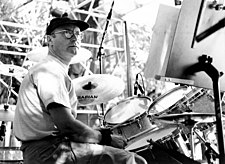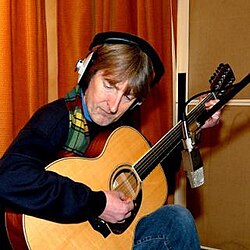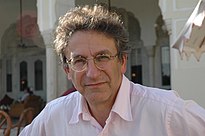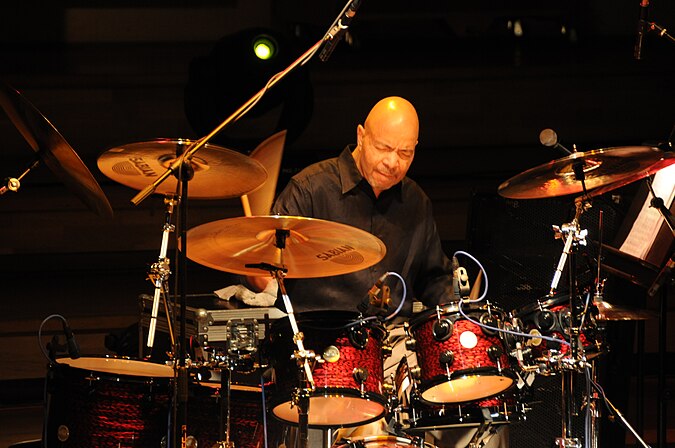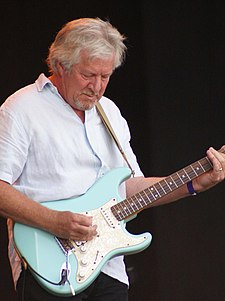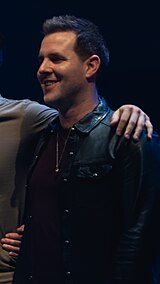List of Genesis band members
Genesis were an English progressive rock band from Godalming, Surrey. Formed in January 1967, the group originally consisted of lead vocalist and flautist Peter Gabriel, guitarist Anthony Phillips, bassist and guitarist Mike Rutherford, keyboardist Tony Banks and drummer Chris Stewart. The band's most recent lineup featured constant members Rutherford and Banks, alongside drummer and vocalist Phil Collins (who first joined in 1970), augmented for live shows by touring musicians, bassist and guitarist Daryl Stuermer, drummer Nic Collins and backing vocalists Daniel Pearce and Patrick Smyth.
History
1967–1971
Following the breakup of earlier groups Garden Wall and Anon, Genesis were formed in January 1967 by Peter Gabriel, Tony Banks, Chris Stewart (all from Garden Wall), Anthony Phillips and Mike Rutherford (both from Anon).[1] The group recorded their first single "The Silent Sun" in December, which was released the following February.[2] "A Winter's Tale" followed three months later.[3] Shortly after the release of the second single, Stewart had to leave when his parents refused to let him leave school to focus on the band.[4] He was soon replaced by fellow student John Silver.[5]
Over a ten-day period during the school summer holidays in August 1968, Genesis recorded their debut album From Genesis to Revelation, which was released in March 1969.[6][7] By August, John Mayhew had replaced Silver,[8] who had moved to the United States to study at Cornell University.[9] Between June and July 1970, the group recorded their second album Trespass, although before its release Phillips announced that he would be departing due to stage fright and other health issues.[10] The remaining members decided to continue, although without Mayhew who was fired.[11]
After advertising for the vacant positions in Melody Maker magazine, Genesis hired Phil Collins as Mayhew's replacement in August 1970.[12] Before bringing in a replacement for Phillips, the group performed for a couple of months as a four-piece without a guitarist.[13] The position was eventually filled temporarily by Mick Barnard starting in November.[14] By January 1971, Barnard had been replaced by former Quiet World guitarist Steve Hackett.[14]
1971–1977
The lineup of Peter Gabriel, Steve Hackett, Mike Rutherford, Tony Banks and Phil Collins remained stable for four years, issuing the albums Nursery Cryme in 1971, Foxtrot in 1972, Genesis Live and Selling England by the Pound in 1973, and The Lamb Lies Down on Broadway in 1974.[15] Gabriel left at the end of the Lamb Lies Down on Broadway Tour in May 1975, although his departure was not officially announced until 15 August 1975.[16]
Genesis auditioned several potential replacements for Gabriel and even briefly considered continuing as an instrumental group, before Collins eventually started performing lead vocals for their next album A Trick of the Tail and took on the role full-time.[17] To allow him to focus on performing vocals, drums on the Trick of the Tail Tour were performed by Bill Bruford.[18] In December 1976, it was announced that Bruford had been replaced by Chester Thompson.[19] However, Collins continued to play the drums on all of the band's studio recordings and he continued to play drums in concert for certain songs, including extended instrumental sections, and he often played percussion onstage while singing. The band's second live album Seconds Out, released in late 1977, mostly includes recordings from the 1977 tour with Thompson on drums, the exception being "The Cinema Show" which is from the 1976 tour with Bruford on drums.
Following the Wind & Wuthering Tour, it was announced in October 1977 that Hackett had left Genesis to pursue a solo career.[20] Prior to the announcement, Collins, Rutherford and Banks had already recorded the group's next album ...And Then There Were Three..., which was issued in March 1978.[21] After Hackett's departure, Daryl Stuermer joined Thompson as a member of the Genesis touring band, performing guitars, bass and backing vocals.[22]
1977–present
The Banks/Collins/Rutherford (with Stuermer/Thompson) lineup of Genesis remained constant for almost 20 years, releasing six studio albums and three live albums.[15] The We Can't Dance Tour of 1992 was the final run to feature this setup, as the band took a break thereafter.[23][24] On 18 September 1993, the trio of Collins, Rutherford and Banks performed at a fundraising event with Tim Renwick on bass, and Gary Wallis and Roger Taylor on drums.[25] Genesis spent the next couple of years on hiatus, before it was announced on 28 March 1996 that Collins had left the band, although Rutherford and Banks assured that they would continue after hiring a new vocalist.[26]
By November 1996, Ray Wilson had been appointed as the replacement for Collins in time for the recording of Calling All Stations, although his addition was not announced until the following June.[27] For the subsequent touring cycle, the new trio were joined by guitarist Anthony Drennan and drummer Nir Zidkyahu.[28] The tour ended in 1998, and by 2000 the group had disbanded.[29]
Six years later, Collins, Rutherford and Banks announced at a press conference in November 2006 that Genesis were reforming for a European tour the following year.[30] The tour, dubbed Turn It On Again, was subsequently expanded to include a North American run of concerts.[31] Alongside the main trio, it also saw the return of touring guitarist/bassist Daryl Stuermer and drummer Chester Thompson.[32] The 2007 concert tour spawned the live album Live over Europe 2007 and the live DVD When in Rome 2007.[33][34] Turn It On Again: The Tour ended with a show in Hollywood, California on 13 October 2007.[35]
A second reformation, the Last Domino? Tour, was announced on 4 March 2020, 13 years after the previous tour.[36] Stuermer returned, alongside Collins's son Nic on drums.[37] The band have since ended due to Collins' bad health.[38][39]
Members
Final lineup
| Image | Name | Years active | Instruments | Release contributions |
|---|---|---|---|---|
| Tony Banks |
|
|
all Genesis releases | |
| Mike Rutherford |
| |||
| Phil Collins |
|
|
all Genesis releases from Nursery Cryme (1971) onwards, except Calling All Stations (1997) |
Former members
| Image | Name | Years active | Instruments | Release contributions |
|---|---|---|---|---|
| Peter Gabriel | 1967–1975 |
|
all Genesis releases from "The Silent Sun" (1968) to The Lamb Lies Down on Broadway (1974) | |
| Anthony Phillips | 1967–1970 |
|
| |
| Chris Stewart | 1967–1968 |
|
| |
| John Silver | 1968–1969 | From Genesis to Revelation (1969) | ||
| John Mayhew | 1969–1970 (died 2009) |
|
Trespass (1970) | |
| Mick Barnard | 1970–1971 | electric and acoustic guitars | none – live performances only | |
| Steve Hackett | 1971–1977 |
|
| |
| Ray Wilson | 1996–2000 | lead vocals | Calling All Stations (1997) |
Touring
| Image | Name | Years active | Instruments | Release contributions |
|---|---|---|---|---|
| Ronnie Caryl | 1971 (one off) (died 2023)[40][41] | guitars | none – one live performance only | |
| Bill Bruford | 1976 |
|
| |
| Chester Thompson |
|
all Genesis live releases from Seconds Out (1977) onwards | ||
| Daryl Stuermer |
|
|
all Genesis live releases from Three Sides Live (1982) onwards | |
| Tim Renwick | 1993 (one-off) |
|
none – one live performance only | |
| Gary Wallis |
| |||
| Roger Taylor | ||||
| Nir Zidkyahu | 1997–1998 | Calling All Stations (1997) | ||
| Anthony Drennan |
|
none – live performances only | ||
| Nic Collins |
|
| ||
| Daniel Pearce[42] |
| |||
| Patrick Smyth[42] |
Timeline

Touring musicians timeline

Lineups
| Period | Members | Releases |
|---|---|---|
| January 1967 – June 1968 |
|
|
| June 1968 – August 1969 |
|
|
| August 1969 – August 1970 |
|
|
| August – November 1970 |
|
none |
| November 1970 – January 1971 |
| |
| January 1971 – August 1975 (temporary reunions for one-off show in October 1982 and in studio during 1995) |
|
|
| August 1975 – October 1977 |
with
|
|
| October 1977 – March 1996 |
with
|
|
| March 1996 – September 2000 |
with
|
|
| September – December 2000 (one-off show in September and live performances filmed in studio for documentary) |
with
|
|
| Band inactive 2001 – November 2006 | ||
| November 2006 – October 2007 |
with
|
|
| Band inactive October 2007 – March 2020 | ||
| March 2020 – March 2022 |
with
|
none |
References
- ^ Moskowitz, David V. (10 November 2015). The 100 Greatest Bands of All Time: A Guide to the Legends Who Rocked the World. Santa Barbara, California: ABC-CLIO. p. 267. ISBN 978-1440803406. Retrieved 14 March 2020.
- ^ Holm-Hudson, Kevin (5 July 2017). Genesis and the Lamb Lies Down on Broadway. London, England: Routledge. p. 24. ISBN 978-1351565813. Retrieved 14 March 2020.
- ^ Carruthers, Bob (10 February 2012). Genesis: The Gabriel Era – Uncensored on the Record. Wootton Wawen, England: Coda Books. p. 11. ISBN 978-1908538734. Retrieved 14 March 2020.
- ^ West, Clare (4 March 2010). Originals with Key: Classic and Modern Fiction and Non-fiction in English. Cambridge, England: Cambridge University Press. p. 7. ISBN 978-0521140508. Retrieved 14 March 2020.
- ^ "Thirty Years of Genesis in Photos". Rolling Stone. 11 November 2010. Retrieved 14 March 2020.
- ^ Blake, Mark (11 February 2014). "Mike Rutherford: Living In The Past, Present And Future". Louder. Retrieved 14 March 2020.
- ^ Eder, Bruce. "From Genesis to Revelation - Genesis: Songs, Reviews, Credits". AllMusic. Retrieved 14 March 2020.
- ^ "John Mayhew: Drummer who played with the fledgling Genesis on 'Trespass'". The Independent. 20 April 2009. Retrieved 14 March 2020.
- ^ Easlea, Daryl (23 March 2018). Without Frontiers: The Life & Music of Peter Gabriel. London, England: Omnibus Press. p. 58. ISBN 978-1787590823. Retrieved 14 March 2020.
- ^ Reed, Ryan (23 October 2015). "How Genesis Found Their Prog-Folk Focus With 'Trespass'". Ultimate Classic Rock. Retrieved 14 March 2020.
- ^ "Without Frontiers: The Life & Music of Peter Gabriel". Sutori. Retrieved 14 March 2020.
- ^ Goldsmith, Melissa Ursula Dawn (22 November 2019). Listen to Classic Rock! Exploring a Musical Genre. Santa Barbara, California: ABC-CLIO. p. 117. ISBN 978-1440865794. Retrieved 14 March 2020.
- ^ Armstrong, Sam (11 February 2016). "Genesis In Pictures: 1970-1975". uDiscoverMusic. Retrieved 14 March 2020.
- ^ a b "Rhino Factoids: Genesis Continues Its Evolution". Rhino Entertainment. 28 March 2017. Retrieved 14 March 2020.
- ^ a b Eder, Bruce. "Genesis: Biography & History". AllMusic. Retrieved 14 March 2020.
- ^ Swanson, Dave (15 August 2015). "The Day Peter Gabriel Left Genesis". Ultimate Classic Rock. Retrieved 14 March 2020.
- ^ Blake, Mark (1 February 2019). "Genesis: the miracle of A Trick Of The Tail and life without Peter Gabriel". Prog. Retrieved 14 March 2020.
- ^ Mayer, Ira; Taylor, Barry (31 January 1976). "New York, N.Y." (PDF). Record World. Vol. 31, no. 1493. New York City, New York: Record World Publishing. p. 183. Retrieved 14 March 2020.
- ^ McCreight, Ron (25 December 1976). "Record World International: England" (PDF). Record World. Vol. 33, no. 1539. New York City, New York: Record World Publishing. p. 195. Retrieved 14 March 2020.
- ^ McGee, David; Taylor, Barry (8 October 1977). "New York, N.Y." (PDF). Record World. Vol. 35, no. 1579. New York City, New York: Record World Publishing. p. 105. Retrieved 14 March 2020.
- ^ Erlewine, Stephen Thomas. "...And Then There Were Three... - Genesis: Songs, Reviews, Credits". AllMusic. Retrieved 14 March 2020.
- ^ Prato, Greg. "Daryl Stuermer: Biography & History". AllMusic. Retrieved 14 March 2020.
- ^ Greene, Andy (29 January 2019). "Guitarist Daryl Stuermer Talks 40-Year Career With Genesis, Phil Collins". Rolling Stone. Retrieved 14 March 2020.
- ^ Prasad, Anil (2007). "Daryl Stuermer: On the Go". Innerviews. Retrieved 14 March 2020.
- ^ Jarman, Robert. "It Was Twenty Years Ago Today That Lord Cowdray Had The Band To Play – The Ruins Band 1993". The Vintage Magazine. Retrieved 14 March 2020.
- ^ Collins, Phil (20 October 2016). Not Dead Yet: The Autobiography. New York City, New York: Random House. p. 340. ISBN 978-1473536142. Retrieved 14 March 2020.
- ^ Giammetti, Mario (November 2010). "David Longdon exclusive interview for 'Dusk'". dusk.it. Retrieved 14 March 2020.
- ^ Considine, J.D. (2 September 1997). "Not Any Old Phil". The Baltimore Sun. Retrieved 14 March 2020.
- ^ Griffin, Louise (3 March 2020). "BBC teases a massive band is reuniting and fans are convinced it's Genesis". Metro. Retrieved 14 March 2020.
- ^ Masters, Tim (7 November 2006). "Genesis reunion 'not about money'". BBC News. Retrieved 14 March 2020.
- ^ "Genesis announce North American reunion dates". NME. 7 March 2007. Retrieved 14 March 2020.
- ^ Rodman, Sarah (12 September 2007). "Genesis still has that invisible touch". The Boston Globe. Retrieved 14 March 2020.
- ^ Jones, Chris (2007). "Genesis Live Over Europe Review". BBC. Retrieved 14 March 2020.
- ^ Perry, Shawn. "Genesis: When In Rome 2007 – DVD Review". VintageRock.com. Retrieved 14 March 2020.
- ^ "Ticket – Hollywood Bowl – Hollywood – 13th October". The Genesis Archive. Retrieved 14 March 2020.
- ^ Greene, Andy (4 March 2020). "Genesis to Launch 'The Last Domino?' Reunion Tour in November". Rolling Stone. Retrieved 14 March 2020.
- ^ Harrison, Ellie (4 March 2020). "Genesis reunion: Phil Collins' son to stand in due to drummer's ill health". The Independent. Retrieved 14 March 2020.
- ^ Curtis-Horsfall, Thomas. "Genesis' Tony Banks confirms the band are over due to Phil Collins' health issues". Smooth. Retrieved 15 August 2023.
- ^ Kielty, Martin (10 May 2023). "The Moment Mike Rutherford Realized Genesis Was Over". Ultimate Classic Rock. Retrieved 26 September 2023.
- ^ "Genesis News Com [it]: Genesis - Nursery Cryme - CD review". www.genesis-news.com. Retrieved 12 August 2023.
- ^ Easlea, Daryl (12 November 2022). "The story of Genesis and Nursery Cryme". louder. Retrieved 12 August 2023.
- ^ a b Andy Greene. "Genesis 'Turn It on Again' at Emotional Reunion Tour Launch in Birmingham". Rolling Stone. Retrieved 20 September 2021.





